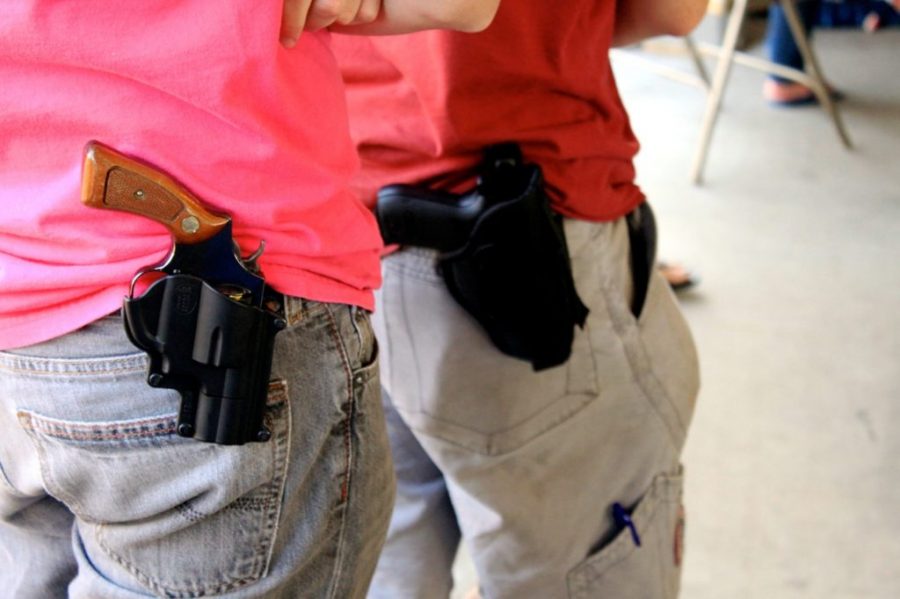Just days after one of the largest mass shootings in U.S. history, four separate measures addressing gun restriction failed on the Senate floor. There has once again been another unthinkable tragedy; and once again, nothing will be done about it.
Although the majority of Americans support efforts to tighten gun laws, politicians in both parties are hesitant to back gun control legislation out of fear of retaliation from the National Rifle Association, a notoriously loud pro-gun lobby. The group argues that restrictive gun measures are not just unconstitutional and tyrannical, they are death sentences. “The only way to stop a bad guy with a gun is with a good guy with a gun,” said executive vice president Wayne LaPierre in 2012.
LaPierre’s comments came a week after a shooting at Sandy Hook Elementary School left 20 children dead.
Talking points like these are constantly regurgitated and politicized following mass shootings. They are not only insensitive, but dangerous. It’s time to dispel the myth that guns prevent mass shootings and make the world a safer place.
The argument goes something like this: bad guys will get their hands on guns regardless of legality. Restricting gun access hardly stops criminals from getting their hands on guns; it only hurts law-abiding citizens. Rather than try to remove guns from society, we should encourage the best of us to take up arms in preparation for a theoretical attack. This, the gun lobbyists argue, is the best way to prevent mass shootings from taking place.
Admittedly, this argument makes sense at first glance. It seems intuitive that having guns in the hands of good people in the event of a shooting would be preferable to waiting for the police to arrive. But this argument falls apart after close examination.
If it were true that arming civilians is an important role in preventing shootings, wouldn’t more shootings have been prevented? According to The Washington Times, there have been 11 documented instances in which an armed “good guy” has prevented or stopped a shooting, but even these instances are misleading. In most cases, the armed good guy was an off-duty police officer, which is hardly the same thing as an everyday citizen. There have been 126 mass shootings in the U.S. in the last 50 years alone. That means for every 100 that occur, roughly nine will be stopped. These are miserable odds. It doesn’t seem like a good idea to bet human lives on them.
It could be argued that these numbers are misleading: if a good guy with a gun had been present, couldn’t these shootings have been prevented? Apparently not. There was an armed “good guy” at Columbine in Colorado, and at Umpqua Community College in Oregon, and at The Pulse nightclub in Orlando. The problem doesn’t seem to be that there aren’t enough guns in the hands of good people. It seems to be that, empirically speaking, taking up arms is an ineffective way of quelling gun violence.
If we want a mass of good guys with guns to prevent mass shootings, then logically we must arm schools, movie theaters, churches and nightclubs; all of which have seen attacks in the last five years. Are these really places we want armed protection? In elementary schools where children outnumber teachers 15 to 1? In poorly-lit movie theaters? Or poorly-lit nightclubs where alcohol is so prodigiously served? This isn’t a blueprint for safety. It’s a recipe for disaster.
Mass shootings only make up a small fraction of overall gun violence. Much more common are incidents related to drug and gang violence, domestic disputes, road rage or user error. It is no coincidence that gun-related death rates in the rest of the developed world pale in comparison to those in the United States, where guns outnumber people.
This issue cannot afford passivity. It demands our immediate attention and action. The safety of everyday Americans is too imperative to justify the non-response we’ve come to expect from our leaders, legislatures and protectors. Sandy Hook was supposed to be the tragedy that would motivate us to meaningfully address the gun epidemic. It hasn’t. There have been more than one hundred school shootings since Sandy Hook, and nothing has changed.
How high does the death toll have to rise to get us to do something?
Gun violence might be a complex issue, and it might not have a simple solution. But that doesn’t mean all proposed solutions are equally valid. There is little to no evidence that guns make society safer. Let’s start thinking of real solutions before we have to pray for another city following another unthinkable— yet totally predictable — tragedy.
We should hurry, because we probably don’t have a lot of time.
letters@chronicle.utah.edu


